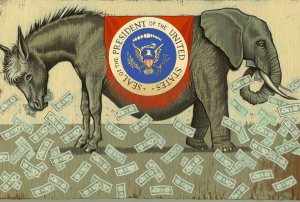The Future of Politics
The Pragmatics and Challenges of ‘Lesser Evilism’
by Robert C. KoehlerÂ
“I have no secret plan for peace. I have a public plan.â€
 I listen to these words with fresh awe, 40 years later. They pierce the soul. Once upon a time, presidential politics was this open, this responsive to moral concerns. The speaker, of course, was George McGovern. The words, delivered during the Democratic National Convention in 1972 — and the campaign that followed — represent the political high-water mark of the social change movements of the 1960s.
I listen to these words with fresh awe, 40 years later. They pierce the soul. Once upon a time, presidential politics was this open, this responsive to moral concerns. The speaker, of course, was George McGovern. The words, delivered during the Democratic National Convention in 1972 — and the campaign that followed — represent the political high-water mark of the social change movements of the 1960s.
“And as one whose heart has ached for the past ten years over the agony of Vietnam, I will halt a senseless bombing of Indochina on Inaugural Day.â€
George McGovern’s death this week at age 90 is a stunning wakeup call — in the middle of an intolerably narrow, superficial presidential campaign, in which such compelling issues as war, peace and climate change are off the table, “the lesser of two evils†is the best choice voters have and almost everyone accepts this choice as the best democracy has to offer. It’s been 40 years since progressives have stood at the threshold of national political change.
Dennis Trainor, creator of Acronym TV, put it this way: “Well, the debate season is over and the consensus is clear. Romney won the first debate, Obama won the second debate, and in the final scripted pageant, the topic of which was foreign policy — the clear, undisputed, hands-down winner was the Bush Doctrine.â€
The United States — “the world’s only superpower†— is an empire caught in a state of perpetual war. I’m not sure how to get out of the tangled mess we’re in, after four decades of social backlash, the regrouping of the corporatocracy and the quiet, near total takeover of government by the military-industrial complex. While four years ago the illusion of fundamental change, bearing the label “hope,†hovered over the political landscape, today that illusion is painfully naked. The path to change is not a political one. Or is it?
In 1972, the trap was already set. The political establishment, including the mainstream media, had reached the limits of its tolerance for progressive politics. If running mate Thomas Eagleton’s history of electric shock therapy — something that sounded spectacularly strange and suspicious to the voting public, compared to mere corruption and deceit — hadn’t derailed McGovern, something else would have.
McGovern ran an open, transparent campaign. The media had access to all the uncertainty of it and delighted in reporting it in exaggerated verbiage, while Richard Nixon and CREEP (the Committee to Re-Elect the President) shut the media out of its inner sanctum completely and engaged, with impunity, in corporate shakedowns, money laundering and outright criminal enterprise, a.k.a., the Watergate break-in.
“I remember dropping in on (McGovern’s) campaign treasurer who proudly took me upstairs to show me the money room,†William Greider, then a Washington Post reporter, wrote recently in The Nation. “There were long folding tables covered with stacks of envelopes and high-spirited women ripping them open and counting thousands of dollar bills. I felt welcome to sit down and start opening envelopes myself…. Across town was the future of politics — the Nixon headquarters. There were armed guards, locked doors with buzzers, special IDs for important people and, who knows, probably hidden cameras.â€
This week, most mainstream accounts of McGovern’s death led off with his landslide 1972 defeat — that granite-etched fact of American history — but failed to hold the credulous media of the time accountable for giving Nixon and his criminal-sleaze re-election campaign a free pass, as though the exposure of Watergate two years later repaired the damage. In 1972, politics that challenged the military-industrial complex and the burgeoning American empire was shoved to the margins of political discourse, and it’s been there ever since.
Yet a national reverence for McGovern — for his decency and humanity, his courage, his prescience and clarity — burns brightly in the wake of his passing. The issues of his ’72 campaign, which many people have called a crusade, are more relevant than ever.
That campaign held the banner for everything positive that was then bursting forth in the U.S. and around the world. It gave voice not merely to the antiwar movement but all the movements that were undoing the old guard, from civil rights to women’s liberation to our dawning awareness of environmental devastation. I fully believe that this, and not Nixon’s criminal campaign, is the future of politics, but how to reclaim this future is hardly certain.
In Trainor’s video on the third Obama-Romney debate, he quoted Green Party presidential candidate Jill Stein:
“We’re seeing a very ill-conceived, irresponsible and immoral war policy come back to haunt us. Where U.S. foreign policy has been based, unfortunately, on brute military force and wars for oil, under my administration, foreign policy will be based on international law, human rights and the use of diplomacy. Instead of fighting wars for oil, we will be leading the fight to put an end to climate change.â€
McGovern’s vision lives — vibrantly in Stein’s message and the hearts of millions, but politically on the margins. The argument that, in 2012, voting for the lesser (Democratic) evil makes pragmatic sense: A Romney victory will re-empower the Bush-era neocon right, to ghastly national and global consequence. But the cost of voting for the lesser evil might mean dooming progressive politics to permanent political irrelevance.
Robert C. Koehler is an award-winning journalist, nationally syndicated writer, and Contributing Author for New Clear Vision. His new book, Courage Grows Strong at the Wound, is now available on his website, commonwonders.com.
